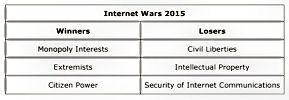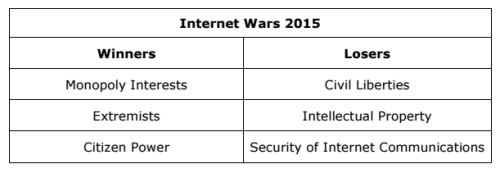
 One of the most critical emerging power struggles of the 21st Century is taking place – the battle to control the Internet. The Internet offers up the opportunity for exercising extraordinary political, economic, and military power. Already exploitation of this super-network has helped create the world’s most valuable company, toppled governments, led to the largest wealth transfer in history, and created the most extensive global surveillance system ever So who won the Internet Wars in 2015? E-diplomacy expert and author of the recently released Internet Wars Fergus Hanson has delivered the verdict.
One of the most critical emerging power struggles of the 21st Century is taking place – the battle to control the Internet. The Internet offers up the opportunity for exercising extraordinary political, economic, and military power. Already exploitation of this super-network has helped create the world’s most valuable company, toppled governments, led to the largest wealth transfer in history, and created the most extensive global surveillance system ever So who won the Internet Wars in 2015? E-diplomacy expert and author of the recently released Internet Wars Fergus Hanson has delivered the verdict.
 Here are the winners and the losers for 2015 Internet Wars 2015 Winners Losers Monopoly Interests Civil Liberties Extremists Intellectual Property Citizen Power Security of Internet Communications Hanson said 2015 was the year a handful of tech titans consolidated their growing control of key economic chokepoints online, making Monopoly Interests the clear winner in 2015.
Here are the winners and the losers for 2015 Internet Wars 2015 Winners Losers Monopoly Interests Civil Liberties Extremists Intellectual Property Citizen Power Security of Internet Communications Hanson said 2015 was the year a handful of tech titans consolidated their growing control of key economic chokepoints online, making Monopoly Interests the clear winner in 2015.
“In 2013, two tech titans made it into the Fortune 500 top 10 by market “In 2015, there were three in the top five and four in the top 10.
“Apple, the world’s most valuable company, was worth about twice as much as the next two largest companies combined.
“Companies like Apple, Google and Facebook are securing control over key economic chokepoints online.
“This is not to suggest smaller companies will disappear from the Internet, just that to do business, they’ll have to operate through these titans,’ he said.
Hanson said 2015 was also the year extremists ran roughshod over the West “The world’s most powerful militaries, their sophisticated intelligence services and vast financial resources were outmanoeuvred by a relatively tiny number of degenerate fanatics,” said Hanson.
Meanwhile, in the US, the Internet Wars of 2015 have seen the shake up of the Presidential election like never before, shining a light on the aggregating power of the Internet for ordinary citizens.
“Republican voters have flocked in droves to outsider candidates Donald Trump and Ben Carson while, in the Democratic campaign, Hillary Clinton has faced surprisingly strong competition from Bernie Sanders,” said Hanson.
Civil liberties, intellectual property and security of Internet communications are all under siege online, with Hanson declaring them all losers in 2015.
Hanson said the Internet might have extended free speech to many, but in the big picture it has been a double-edged sword.
“Companies like Facebook, with one fifth of the world as users, has begun to exercise an important role as the new moral guardian.
“Its leaked censorship guidelines from 2012 revealed it forbade breastfeeding but gave the thumbs up to crushed heads,” he said.
So is peace possible online?
Hanson said, as a global commons, the Internet will always be open to abuse by individuals, companies, and governments.
“But if broad rules of the road can be agreed, breaches can become the exception rather than the norm, allowing the most important features of the Internet to be preserved.
“This is not an overnight fix. The first step is recognising the turning point we have reached, the critical importance of what’s at stake, and the need to act.
“As an advanced economy and open democracy Australia has a critical interest in securing the Internet’s immense promise into the future.
“Australia should develop a digital foreign policy that identifies our core economic, social and security interests and engage in leading global debates,” he said.

Comments
Dennis K
Sun, 2015-12-20 14:11
Permalink
Internet remains open, but people choose closed and proprietary
John Bentley (not verified)
Mon, 2015-12-21 10:02
Permalink
Candid and open
Dennis K
Mon, 2015-12-21 20:29
Permalink
Potential is what people make of it
Geoffrey Taylor
Mon, 2015-12-21 11:28
Permalink
Facebook & Margo Kingston's 'NoFibs' also enforce 'real names'
Protesters push Facebook to revise 'real name' policy
from RT, 16 Dec :
Margo Kingston, author of Not Happy, John (2003) who now edits the 'Citizen Journalism' web-site No Fibs, also insists upon contributors to No Fibs using only their real names.
Some time after 2006, Kingston disallowed any posts advocating 'conspiracy theories' on her web-site, then known as 'Web Diary'. Not withstanding her claimed objection to then Prime Minister John Howard taking Australia to war against Iraq in 2003, her objection to 'conspiracy theories' has since morphed into a failure to oppose any the ongoing wars of the late 20th and early 21st centuries by the United States or its vassals – Libya, Syria, Iraq, Afghanistan, Ukraine, ...
The only mention of any of these conflicts, which I could find on No Fibs is an article about the Syrian conflict, War, greed and the future of #Syria: (3/11/15). This article repeats the current mainstream media cover story for war to overthrow the democratically elected 'Assad regime':
The above quote on No Fibs is from Syrian defectors reveal horrors of life under Bashar al-Assad's regime in reminder for West to 'not just focus on fighting Isis' (17/8/15) The Independent.
Dennis K
Mon, 2015-12-21 20:21
Permalink
Banning conspiracy theories is banning dissent.
By banning "conspiracy theories", they are essentially forbidding any criticism of "official stories". If one was to question why the USA took so long to fight ISIS, has failed to defeat it, has taken measures to avoid fighting it, and turns a blind eye towards their oil trafficking, and suppose that perhaps this was the result of foriegn policy, then this would make one a "conspiracy theorist".
If one was to suppose, or suggest that the government was using policy to keep house prices high, then this would make one a "conspiracy theory", as such a suggestion is a suggesting that a conspiracy is occurring.
Any site which does this is not worth the bytes of data to load it.
Here some conspiracy theories which turned out to be true. Note this is only a selection of what is available:
Geoffrey Taylor
Tue, 2015-12-22 00:22
Permalink
The true worth of NoFibs
Just briefly, for now:
DennisK wrote:
In fact, sites like NoFibs.com.au, and the political groups behind them, are worth a lot, but not to those who oppose the vested interests of the wealthy elites, or at least the more overt consequences of their misrule, as NoFibs purports to.
They cause people, who might otherwise be truly effective, to pour their effort and money into political activism that will make almost no tangible difference.
Those of us who are able to see NoFibs for what it is, should, amongst other tasks, show it up for what it is.
Add comment